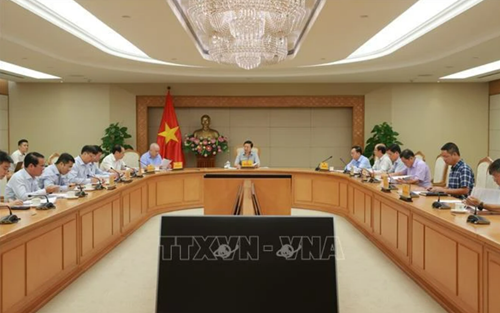Chairing a meeting on the establishment of a carbon market in Vietnam, Ha said that the establishment is difficult and complex, with many developments and changes, requiring a unified commitment to global-scale implementation.
    |
 |
|
Deputy Prime Minister Tran Hong Ha chairs a meeting on the establishment of a carbon market in Vietnam. |
Currently, many countries have established carbon markets, gradually forming technical barriers related to carbon credits for goods.
"To ensure the interests of businesses and the nation, Vietnam cannot stand aside this trend," he emphasized.
He urged ministries and agencies to analyze and clarify the necessary conditions to form a carbon credit market with full political and legal bases and engagement of each ministry and sector, and then develop a synchronous implementation roadmap.
The operation of the carbon market must follow a roadmap under the management of the State, match the capacity and development levels of businesses and the economy, and ensure national interests, Ha said, adding that it’s necessary to learn experience through joint ventures, partnerships or cooperation mechanisms but ministries and agencies must stay proactive.
According to the Deputy PM, the project on the establishment of the carbon market aims to help Vietnam fulfill international commitments to reducing greenhouse gas emissions, creating new financial flows for greenhouse gas emission reduction activities, and creating motivation for green transition for industries and economic fields.
He said that on the basis of Nationally Determined Contribution (NDC), the Ministry of Natural Resources and Environment must allocate emission quotas for each field, industry, and enterprise; guide ministries, agencies, businesses, and consulting organizations on calculation formulas, measurements, statistical reports, appraisals of emission quotas and carbon credits.
Deputy Minister of Finance Le Tan Can said that carbon market transactions are proposed to be made on an online platform. It is expected that the roadmap for carbon market development includes two phases with the pilot phase from 2025 to 2027 and the official operation from 2028.
Groups of solutions include greenhouse gas inventory and allocation of greenhouse gas emission quotas; carbon credit management; greenhouse gas emission quota and carbon credit trading system; management, inspection and supervision; and awareness improvement and capacity enhancement.
Specific tasks are perfecting legal mechanisms and policies; building a system for credit trading and organizing and operating the carbon market; and communications programs to raise awareness of the carbon market among target groups.
In Vietnam, more than 300 programmes and projects have registered to be implemented with carbon credit mechanisms. Of these, about 150 were granted more than 40.2 million carbon credits which have been exchanged on the world carbon market.
Source: VNA